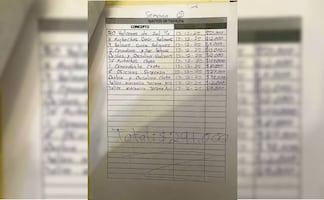Más Información

Narco “La Rana”, entre altar a la muerte, corridos de Los Rayos del Norte, drogas y armas doradas; EU difunde foto de como vivía

Sheinbaum ajusta horario de conferencia mañanera este 26 de febrero; se realizará desde Mazatlán, Sinaloa

Ellos son “La Rana” y “Aquiles”, hermanos Arzate-García, jefes del Cártel de Sinaloa; EU los busca por narcoterrorismo
U.S. Border Patrol officials
told reporters on Tuesday that there has been a dramatic shift in how migration is happening along the U.S.-Mexico border, with large numbers of families and unaccompanied children from the northern triangle countries of Guatemala, Honduras and El Salvador replacing mostly single adult men from Mexico who typically crossed the border illegally in the past.
Apprehensions and people deemed inadmissible at ports of entry along the southwest border reached a record high of more than 76,000 in February , and the majority of those caught were families, according to U.S. Customs and Border Protection (CBP) statistics.
In recent years, applications for asylum have ballooned as more Central Americans fleeing violence back home turn themselves into authorities to seek protection, according to CBP data.
Facing an influx of families and legal limits on the time minors can be held, U.S. Immigration and Customs Enforcement (ICE) began to release large groups to Arizona charities and churches in October , ICE spokeswoman Yasmeen O’Keefe said.
Adults are outfitted with a monitoring ankle bracelet on a case-by-case basis when they are held at ICE facilities in Arizona, according to ICE. Migrants are assigned an immigration court near where they will live. They can wait years for their asylum hearing due to a backlog in cases, according to Reuters data.
Migrants stay at the shelters for a night or two to get a hot meal, a shower, a medical check up and maybe some legal advice. Volunteers help with travel plans, then drop the migrants off at the bus station or airport. They journey on to stay with friends or family in the United States while awaiting court hearings, according to CCS.
But their prospects for getting asylum are dim.
CBP Commissioner Kevin McAleenan said on Tuesday that while approximately 80 percent of people asking for asylum pass initial screening at the border, only about 10 to 20 percent of Central Americans are found to have valid claims at the end of their immigration court process.
While many migrants fleeing Central America have said they left their home countries to escape poverty, violence and crime, hoping to find a better life in the United States, often those reasons do not meet the high legal bar required to avoid a deportation order.
The Trump administration is concerned the asylum process is being abused, and has made efforts to curb the number of applications. The Trump administration recently announced that it was aiming to expand a program to send Central American asylum seekers to await U.S. court dates in Mexico.
Last week, U.S. President Donald Trump threatened to close the U.S. Mexico border through his Twitter account, to which Mexican President Andrés Manuel López Obrador responded that he would maintain a cautious approach with his U.S. counterpart.
The chief of state met with American congressmen led by democrat Eliot Engel , who voiced his opposition to the border closure.
Mexico’s Ministry of Interior Olga Sánchez Cordero expressed that no plan would be applied to keep migrant caravans from entering the country. “We cannot pretend that they don’t exist,” she stated, adding that migrants who entered the country would be guaranteed protection.
dm
Noticias según tus intereses
[Publicidad]
[Publicidad]












